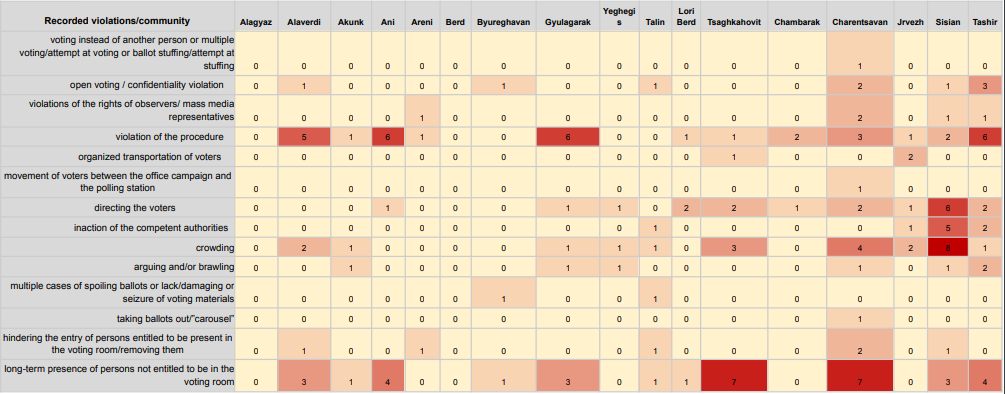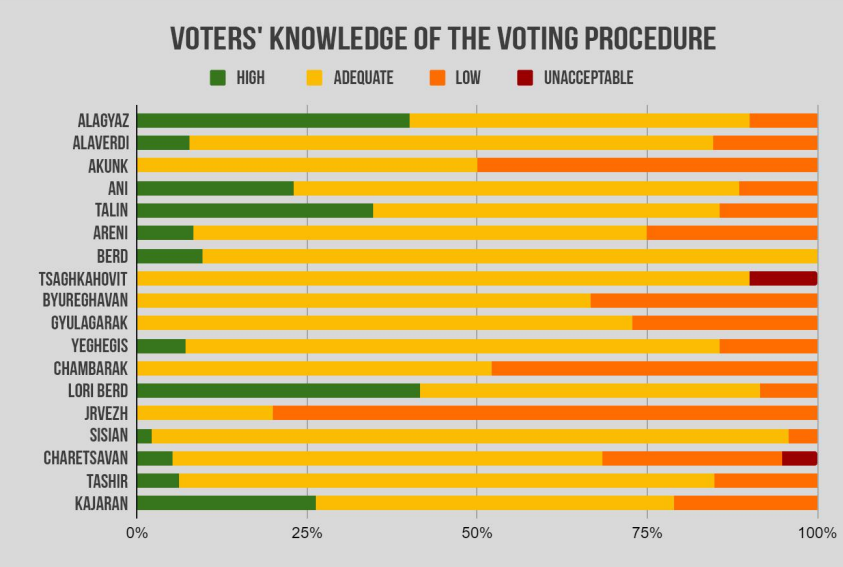
On 25 September 2022, local elections were held in 18 communities of Aragatsotn, Gegharkunik, Lori, Kotayk, Shirak, Vayots Dzor, Syunik and Tavush provinces; the elections were held through the proportional electoral system in 17 of the above-mentioned provinces, and through the majoritarian electoral system in one of them. The territory of the elections covered 282 settlements.
11 alliances and 16 parties were nominated to participate in the local elections held through proportional electoral system on 25 September 2022․ Only one force was nominated in Chambarak community of Gegharkunik province and one in Jrvezh community of Kotayk province. “Civil Contract” was not nominated only in Chambarak community. Registration of the “Nzhdeh Tseghakron” party was rejected, since the submitted package of the required documents was incomplete.
Thus, 11 alliances and 15 parties were registered to participate in the elections of local self-government bodies in 17 communities. Due to the self-recusal of 19 candidates of the “For the sake of the people” alliance nominated in Gyulagarak community, registration of the alliance was recognized invalid.
The Independent Observer public alliance observed the election campaign in 17 communities (except Chambarak), and the elections on the voting day with 48 mobile groups in all the communities.
The observation mission was conducted by 17 long-term observers, 98 short-term observers, 5 lawyers and a 20-member training, coordinating and communication team.
A new methodology and toolkit were used while observing these elections.
The Independent Observer issued a midterm report on the electoral campaign phase and the participating forces.
Summary of the observation carried out on the voting day
Morning session of the Commission (7:00-8:00)
The morning session of the Commission was observed in 69 out of 314 polling stations.
In 0.2% of the polling stations observed, the session started with a 15-30-minute delay due to the absence of the commission members or technical reasons. In two polling stations, the session started before 7:00. In 13% of polling stations, the president did not perform their functions on their own. In 17.3%, procedures of the commission’s session were observed partially, and were not observed in 2 cases.
In addition to representatives of the Independent Observer Alliance, media representatives were also present in 4 polling stations, other observers were present in 2 polling stations, proxies of more than one party/alliance competing in the elections were present in 28 polling stations (a proxy of only one force was present in 20 other polling stations). Only representatives of the Alliance were present during the session in 19 polling stations.
The polling stations opened for the voting at 8:00, 2 polling stations opened with a slight delay.
Accessibility, discipline of the commission, and working conditions
248 polling stations were assessed in terms of accessibility on the voting day.
Voting rooms were not on the ground floor in 11.2%, one was on the basement floor, the others were on the second floor. Even very limited accessibility adjustments become ineffective in these polling stations. This issue was most common in Sisian community.
In 47.9%, there were obstacles on the road to the polling stations; the entrance of 57.2% of polling stations had stairs with either no ramp or one not serving its purpose. It is welcome that 18.9% of the polling stations observed had ramps, which were assessed as suitable.
With the purpose of ensuring that blind persons or persons with vision impairment can vote independently during the elections held through the proportional electoral system, special Braille templates have been used since the NA elections of 2021. These templates, however, were provided only to all the PECs in Talin and PECs functioning under 28 TECs in Akunk and Byureghavan communities.
Lighting was considered inadequate in voting rooms in 17 polling stations, and voting booths in 16 polling stations, as well as in both the room and the booth in 12 polling stations (4.8%).
The observers assessed as inadequate the knowledge of organizing voting of persons with disabilities in 36.2% of the commissions.While this issue was more typical of Tashir and Alaverdi communities, it should be mentioned that except the trainings conducted before the NA elections of 2021, none of the commissions had undergone a special or general training prior to these elections.
Further, it is noteworthy that the working conditions of the commission were also inadequate. In 7.2% of polling stations, and particularly in Tashir and Sisian communities, the temperature of the voting room was assessed inadequate or inadmissible; the working area was insufficient or unacceptably small in 8.8% of the polling stations, particularly in Tsaghkahovit community. In 21.7% of the polling stations, there was either no toilet or one in an inadequate, unacceptable state (mainly schools, kindergartens, and cultural centers serve as polling stations). The situation was the worst in Talin community.
Not excluding the negative effect of working conditions, which is obviously interconnected with conscientious performance of duties, it should be mentioned that the observers assessed as inadequate the knowledge of procedures in 7.6% of PECs; in particular, such commissions were common in Sisian community. The lack of knowledge of procedures and their recent amendments, as well as the lack of the relevant training probably essentially affected the conduct of the commissions. This was reflected in their reluctance in terms of taking measures to eliminate violations, which was recorded in 9.6% of polling stations. Limited cases of this issue were recorded in all the communities.
In 2.2% of the polling stations, the observers noticed that there was incomplete registration of the data of those assisting voters unable to vote on their own. Management of the proxy lists was assessed as improper in 6.6% of the polling stations. Problematic commissions often registered more than one proxy from one force, sometimes justifying this by the condition that those persons were in the voting room one at a time, while second proxies mainly stayed in the polling station or nearby area at a distance of a 50-meter radius, by violation of the norms of the law. The commissions also argued that the restriction of 1 proxy was a new regulation, while the restriction on the presence of only 1 proxy from each force always acted in proportional elections of the local self-government bodies.
Statistics, incidents, and summary of violations recorded during the voting
Overall, the observers visited 273 out of 314 polling stations on the voting day, and recorded violations in 84 of them, which amounts to 30.7%. A total of 176 violations were recorded. Below you can see those violations per type and community. The same violations often repeated in the same polling stations due to the inaction of commissions and police officers. Proportion of recorded violations in the observed polling stations:

A single violation recorded involved movement of voters between the campaign office in Charentsavan community and two other campaign offices under a residential building nearby (“Civil Contract” and “United Community”) and their possible direction; another violation recorded a single time again took place in Charentsavan community, where a few attempts were made to take ballots out of the polling stations.
Two cases of spoiling ballots, and two cases of double scanning of the passport through the device were recorded. In particular, in Jraber community of Byureghavan, the commission member in charge of the ballot box, being unaware, put the stamps on the envelope, instead of the ballot paper. Cases of double scanning passports were recorded as a result of incorrect instructions of those assisting the process, when they tried to register through the device instead of registering in their registry. Vote count was observed in 58 polling stations.



Proxies of a party/alliance were present during the vote count in all the polling stations, and representatives of only one force were present in two cases. Observers from other organizations were present in 12 polling stations, mass media representatives were present in 8 polling stations.
The main issue during the vote count was the commission members’ improper knowledge of legal regulations regarding the electoral processes. In particular, members of the commission were not aware that persons entitled to be present during the summarizing session of vote count can arrive anytime and participate in the session. In a number of polling stations, they tried to hinder entry of both observers and candidates into the voting room.
An essential non-procedural incident occurred only in polling station N 34/6 in Sisian, where the Civil Contract proxy damaged ballots voted in favor of the “Labor and Justice” alliance, with respect to which a relevant protocol was made.
In case of observers, the issue was resolved through the intervention of lawyers and superior commissions; while in case of candidates, they were removed from the polling stations upon the demand of the commission, without challenging that demand due to being unaware of their own rights. Moreover, there were also cases when the commission justified removal of a candidate by the restriction on the presence of more than one candidate. While this restriction applies to proxies of candidates, it does not apply to candidates.
Conclusion
Elections held on 25 September 2022 reflect the decision of voters who participated in the voting in the polling stations. However, it is necessary to have a final summary of the long-term observation and conduct a study of the circumstances and description of violations recorded by the observers in order to assess the degree to which certain conditions and the used illegal methods affected those decisions, as well as assess elections in communities essentially different from one another.
The Alliance will make a separate publication to assess the quality of elections in the communities and analyze the results.
Statement of “Independent Observer” on local elections on 25 September 2022
Independent Observer mission, represented by
∼ Helsinki Citizens’ Assembly Vanadzor Office
∼ Union of Informed Citizens
∼ Direct Democracy
∼ Progress of Gyumri
∼ Restart Gyumri / Gyumri Restart Center for Initiatives, CSI NGO
∼ Women’s Rights House
∼ Yezidi Center for Human Rights
The observation mission is implemented in the frame of “Independent Observer – local elections 2022” project funded by the Prague Civil Society Center and European Endowment for Democracy.
Responsibility for the content of this publication lies with the Independent Observer public alliance, and it does not necessarily reflect the views of the funding organization.


